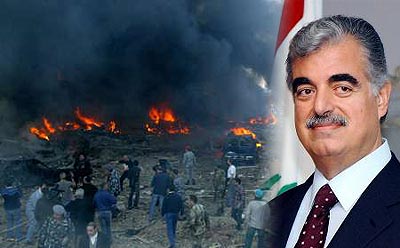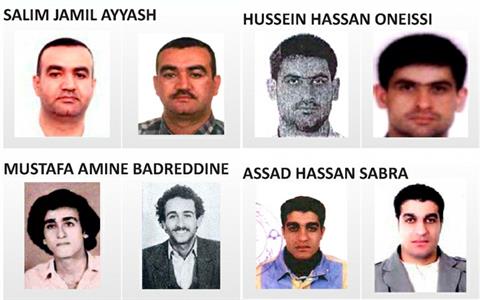
A U.N.-backed court investigating the 2005 assassination of ex-premier Rafik Hariri hears closing arguments this week, with four Hizbullah suspects on trial in absentia for more than four years.
Here is a look back at the killing and efforts to bring the perpetrators to justice.
– The assassination –
A massive bomb tears through Hariri’s armored convoy as he is on his way home for lunch on February 14, 2005, gouging a crater several meters deep and leaving a dozen flaming vehicles and debris scattered over a wide area.
The prime minister and 21 other people, including seven of his bodyguards, are killed and more than 220 other people injured.
The blast was caused by a suicide bomber who detonated a small truck full of what prosecutors said were military explosives equivalent to 2.5 tons of TNT.
Opposition leaders blame Syria but Damascus denies any role in the killing.
Amid a groundswell of domestic and international protests, Syrian troops quit Lebanon on April 26 after a 29-year deployment.
Faced with bitter domestic inter-religious divisions, Lebanon asks the United Nations on December 12 to create an international tribunal.
– The court –
The U.N. Security Council votes on May 31, 2007 to set up an international court to try suspects in the murder.
The Special Tribunal for Lebanon (STL) is the first international court with jurisdiction over the crime of terrorism and the first to try suspects in absentia.
Hizbullah refuses to recognize the court, slamming “an aggressive interference in (Lebanon’s) internal affairs.”
The STL opens its doors in Leidschendam, a suburb of The Hague, on March 1, 2009, with the identities of its 11 judges, four of them Lebanese, kept secret for security reasons.
The Lebanese government is meant to cover 49 percent of its costs.
– The suspects –

STL prosecutors file an initial, sealed indictment on January 17, 2011 that does not name suspects.
On June 30 it sends sealed indictments and arrest warrants to the Lebanese prosecutor general.
The next day Lebanese authorities confirm the identity of four Hizbullah suspects named in the arrest warrants. They are Salim Ayyash, Mustafa Badreddine, Hussein Oneissi and Assad Sabra.
Hizbullah refuses to hand over the suspects.
On February 1, 2012 the court says it will try the four in absentia.
The STL confirms on October 10, 2013 the indictment of a fifth wanted suspect, Hassan Habib Merhi.
– The trial –
The trial gets underway on January 16, 2014 with the four Hizbullah suspects in absentia. Although there are international arrest warrants against them, Hizbullah continues to refuse to cooperate with the court and hand them over.
Prosecutors say Mustafa Badreddine and Salim Ayyash prepared the attack. Hussein Oneissi and Assad Sabra are accused of sending a false video to the TV channel Al-Jazeera in which a fictitious group claims responsibility.
In February the judges merge the trial of the fifth suspect with that of the four.
On May 13, 2016 Hizbullah announces that Badreddine has been killed in an attack in Syria, where the war between the regime, rebels and jihadists has been raging since 2011.
On March 7, 2018 the STL throws out a bid to acquit Oneissi of any role in the assassination, judging that the prosecution has sufficient evidence to justify the continuation of his trial.
Closing arguments are due to run from September 11 to September 21
AFP

Leave a Reply
You must be logged in to post a comment.